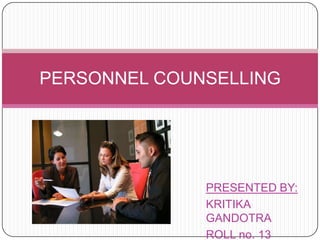
Personnel counselling
- 1. PERSONNEL COUNSELLING PRESENTED BY: KRITIKA GANDOTRA ROLL no. 13
- 2. Counseling , Coaching and Mentoring counseling and coaching/mentoring are viewed as developmental programs and are considered positive approaches in aligning employee behavior with employer’s expectations, goals and organizational vision.
- 3. Coaching, Mentoring, Counseling Coaching is a process where a peer or manager works with an employee to motivate her, help develop her skills and provide reinforcement and feedback Mentoring is a process where and experienced productive senior employee who helps develop a less- experienced employee. Employee Counseling is defined as a discussion between the employer and the employee about the real or perceived performance deficiency or job-related behavior; the employee's perception of the identified behavior and the employer’s involvement in helping the employee correct these behaviors; and the employee's attempt to reduce or eliminate the misconduct or incompetence
- 4. Counseling Direct face-to-face conversation between a supervisor and a direct report Used to help the employee identify the reason for poor performance to improve, not embarrass or humiliate him or her Generally more formal than feedback and coaching
- 5. EMPLOYEE COUNSELLING It is defined as discussion of an emotional problem with an employee, with the general objective of decreasing it. Counseling: Deals with an emotional problem. Is an act of communication. Is generally to understand and/or decrease an employee’s emotional disorder. Can be done by both, the managers and the professionally trained counselors.
- 6. Counseling is : guiding, consoling, advising, sharing, Helping, to resolve their problems whenever the need arises.
- 7. OBJECTIVES OF COUNSELING 1. Understanding self 2. Making impersonal decisions 3. Setting achievable goals which enhance growth 4. Planning in the present to bring about desired future 5. Effective solutions to personal and interpersonal problems. 6. Coping with difficult situations 7. Controlling self defeating emotions 8. Acquiring effective transaction skills. 9. Acquiring 'positive self-regard' and a sense of optimism about one's own ability to satisfy one's basic needs.
- 8. TYPES OF COUNSELLING • Performance counseling: The need for employee counselling arises when the employee shows signs of declining performance, being stressed in office-hours, bad decision- making etc.It cover all the aspects related to the employee performance like the targets, employee's responsibilities, problems faced, employee aspirations, inter-personal relationships at the workplace, etc. Personal and Family Well being: Many a times, employees carry the baggage of personal problems to their workplaces, which in turn affects their performance adversely. Therefore, the counselor needs to strike a comfort level with the employees and, counselling sessions involving their families can help to resolve their problems and enabling them to improve their work performance.
- 10. Types of Counseling: Directive, Non-directive, and Cooperative
- 11. Directive Counseling Directive counseling is the process of li stening to a member’s problem, deciding with t he member what should be done, and then encouraging and motivating the person to do it Accomplishes the function of advice; but it may also reassure; give emotional release; and, to a minor extent, clarify thinking.
- 12. Nondirective Counseling Nondirective, or client- centered, counseling is the process of skillfully listening to a cou nselee, encouraging the person to explain bothers ome problems, and helping them to understand those problems and determine courses of action This type of counseling focuses on the m
- 13. PERSONAL COUNSELING Examples - drug and alcohol abuse, psychological problems or behavioral disorders, medical problems, limitations, personality conflict
- 14. When to counsel? An employee should be counseled when he or she has personal problems that affect job performance. • Sudden change of behavior • Irritability • Increased accidents • Increased fatigue • Excessive drinking • Reduced production • Waste • Difficulty in absorbing training.
- 15. Who should do the counseling? Supervisors/Managers or (Superiors in hierarchy), Specialists, and Professional counselors.
- 16. In any case, in the counseling relationship, the following conditions are essential: Counselee should psychologically accept the counselor. Counselor must be able to listen well and communicate effectively. An atmosphere of trust and confidence. Credibility & Sensitivity of the counselor.
- 17. Counselling skills? Listen carefully Demonstrate empathy Do not make judgments Understand emotions/feelings behind the story of the person being counseled Question with care Ask open ended questions Reflect back, summarize and paraphrase so that the understanding is correct and complete Use appropriate body language Do not show superiority or patronage
- 18. Why is it not frequently used? Right from getting top management approvals and budgetary sanctions to getting trained counselors on the rolls or on part time basis all are equally challenging. Preparing the employees for counselling is another yet important areas. One of the biggest fears that prevent employees from using the services of a counselor is the social and professional stigma attached to counselling.
